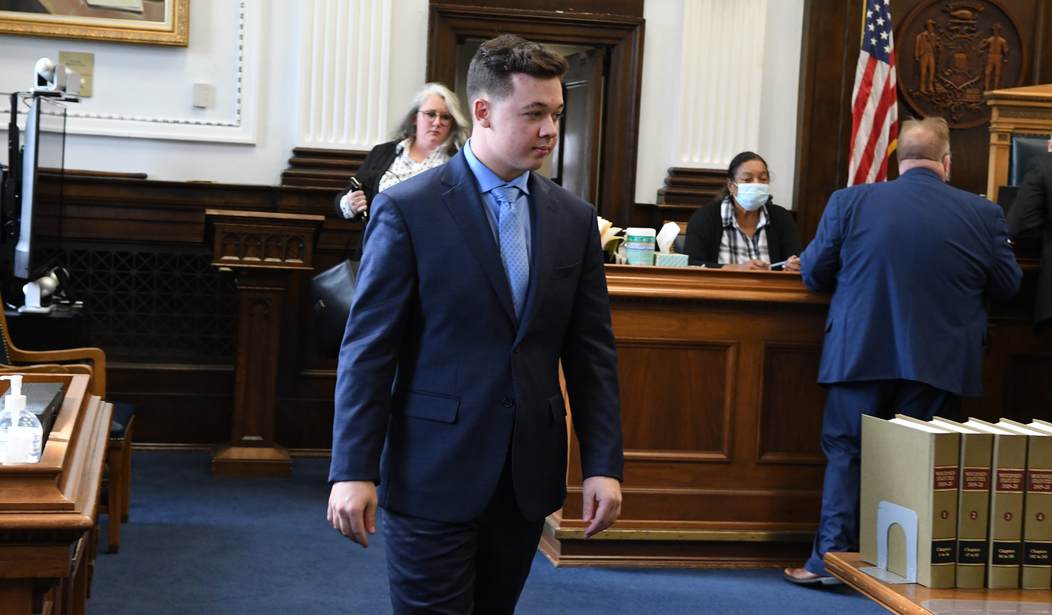As I highlighted earlier today, CNN's Chris Cuomo on his Friday night program, "Cuomo Prime Time," appears to really, truly have it out for the Wisconsin state law which enabled the jury to find Kyle Rittenhouse "not guilty," as a matter of self-defense. In a CNN opinion piece, Jennifer Rodgers, a former federal prosecutor, law professor, and CNN legal analyst, wrote that "After Rittenhouse verdict, it's time to question the law," referring to the state's open carry laws.
A lot of Rodgers' piece is what you might expect from a leftist publication. For instance, in one paragraph she claims that Judge Bruce Schroeder "didn't make things easy for the prosecutors" and "seemed to some to betray a pro-Rittenhouse bias," one example being, because, wait for it, he "encouraged a round of applause for a defense witness on the stand because he was a veteran."
Rodgers doesn't mention that it was Veteran's Day, but the New York Times piece she links to, by Nicholas Bogel-Burroughs, confirms that it was. Something tells me that that's a Veteran's Day commemoration and not a defense witness bias, especially since Bogel-Burroughs also points out that the witness was the only veteran in the room.
A significant portion of Rodgers' piece lays out and laments why the case was so hard for the prosecution. Ultimately, it's revealed that "the law" she is addressing is open cary. She's using the Rittenhouse trial as an excuse to let everyone know how she feels about gun laws:
Those of us who don't want to have to worry about whether people like Kyle Rittenhouse will continue to brandish guns at public gatherings, thereby greatly increasing the danger of violence, should direct our energy toward changing the open carry laws in Wisconsin.
Public sentiment after an episode that is viewed as unfair -- and there are plenty of people who are incensed that Rittenhouse went free because of a self-defense claim when he placed himself in the situation in the first place -- can spark change. For example, in Georgia, after the shooting of Ahmaud Arbery, the legislature repealed the citizen's arrest law that Arbery's alleged killer and his co-defendants are relying on for their defense (although the defendants in the Arbery killing are still able to assert it).
If public concern about Rittenhouse's conduct and its results leads to a re-examination of Wisconsin's gun laws, that will be one positive thing to come out of this tragic episode.
While Rodgers is specifically taking issue with the open carry laws here, she does address the self-defense law as well:
Recommended
Trying to weigh Rittenhouse's self-defense claim amid the two dueling narratives was not an easy job for the jury. One could reasonably argue that Rittenhouse provoked the attacks on him by openly carrying his weapon in a threatening manner, and that he had the option to retreat or otherwise avoid using deadly force, even if defending himself. If the jury had found either of these things to be true, it would have defeated the self-defense claim. But there was also evidence -- including the critical videos of the events in question and the testimony of Rittenhouse himself -- that in the key moments right before he pulled the trigger, Rittenhouse acted in response to imminent threats to his personal safety because he believed he was in danger.
The laws and applicable legal standards also created a tough road for prosecutors trying to win a conviction here. Our criminal justice system generally favors the defendant, because of our core belief that it is better to see a guilty man go free than to convict an innocent one. Thus in criminal cases, prosecutors carry the highest burden of proof known to our legal system: proof beyond a reasonable doubt.
Like in many other states, Wisconsin law is sympathetic to homicide defendants claiming self-defense. Once a defendant raises self-defense as an issue, it requires prosecutors to prove, beyond a reasonable doubt, that the defendant did not act in self-defense.
That last hyperlink leads readers to a piece from the Washington Post, by Fordham Law Professor John Pfaff, in a much more useful piece, "Rittenhouse didn’t have to prove he acted in self-defense."
As Pfaff points out:
That the burden of proof is on the state, not the young man wielding the gun, may seem surprising to many, but Wisconsin’s approach is the mainstream one. Virginia may be the last state that requires a defendant to prove that he or she was acting in self-defense, after Ohio reformed its law in 2019. State defensive-force statutes often vary widely in how they are written — with differences that can determine whether a defendant is found innocent or guilty — but putting the burden of proof on the prosecution is something nearly all of them have in common.
Perhaps Rodgers should pass this piece along to her CNN colleague and fellow law school graduate, Chris Cuomo.
For what it's worth, when it comes to guns in Wisconsin, another CNN piece, "Here's what legal experts say helped acquit Kyle Rittenhouse," mentions gun culture there in Kenosha:
In addition, trying to paint Rittenhouse as provocative because he brought an AR-15 firearm did not work because of the culture of guns in Wisconsin, which aren't necessarily always equated with criminal activity, legal experts told CNN.
'You've got to remember you're in a jurisdiction where this is not an unusual thing," [criminal defense attorney Bob] Bianchi said.
And, as it turns out, Wisconsin looks to be moving in the other direction on guns from what Rodgers would prefer. As Henry Redman reported for Wisconsin Examiner last month, Republicans in the state legislature have brought forth Senate Bill 619, which allows legal gun owners to carry a concealed weapon without a license.

























